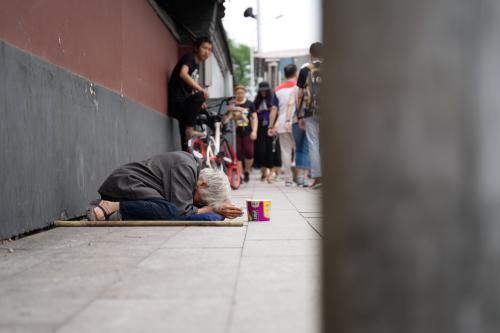Notwithstanding what a bad year 2020 was, when people said they “couldn’t wait for 2021,” I was skeptical. Why did they think that circumstances would change on December 31, 2020, an arbitrary point in time? In fact, many of the debilitating factors in 2020—a raging pandemic, collapsing global economy—looked likely to get worse in 2021. Some of us were concerned that the COVID-19-related increase in public spending in developing countries would be just as inequitable and ineffective as traditional public spending. Finally, the efforts to overturn the U.S. elections that began in late 2020 reached a crescendo on January 6, 2021, when armed protesters stormed the U.S. Capitol and American democracy literally and figuratively dodged a bullet.
On reflection, however, I am optimistic about 2021, because of what we are learning. Here are three lessons.
1. COVID-19-related public spending has a better chance of reaching the poor.
Many COVID-19 programs are doing at least one of two things that have been shown to make public spending more effective. One is to engage communities and civil society in the management of public expenditures. The second is to provide information, alongside money and other resources, to poor people to influence behavior. In West Bengal, India, some 25 million people were sent an SMS message by Nobel Laureate and West Bengal native Abhijit Banerjee encouraging various health-promoting behaviors such as social distancing, handwashing, and reporting symptoms to community health workers. Not only did the intervention significantly increase the suggested behavior in the treatment group, but it seemed to increase behaviors, such as mask-wearing, that were not mentioned in the original message. This is also a rare case where the paper’s co-author (Banerjee) is also part of the identification strategy.
2. People are not sweating the big stuff.
In many countries, there are one or two giant distortions that impede growth and poverty reduction. In Sri Lanka, the land policy constrains farmers to grow paddy while other crops such as fruits and vegetables are more lucrative. In South Sudan, whereas the official exchange rate is 55 South Sudanese Pounds (SSP) to the U.S. dollar, the parallel market rate is about 500 SSPs to the dollar. In both cases, policy advisers (including myself) have tried to convince the government to remove the distortions—but they have remained in place. In reviewing these countries’ experiences last year, it dawned on me that the private sector seems to find ways of getting around these distortions, especially when they are egregious. Sri Lanka has a few, large firms that export canned fruits and vegetables, where the raw material is bought from those farms that are permitted to grow them. The Bank of South Sudan decided to hold an auction for the foreign exchange that it received as part of an IMF program. At these sealed-bid auctions, the dollar fetched a price of over 500 SSPs. The lesson here is that, when a distortion gets extremely big, people find ways of working around it. To reword Richard Carlson, don’t sweat the big stuff.
3. Breaking up is harder than getting together.
Last year saw Britain’s exit from the European Union and the signing of the African Continental Free Trade Agreement (AfCFTA). The contrast between these two processes was stark. The AfCFTA proceeded fairly smoothly, albeit only in the first stages of integration. Meanwhile, Brexit still has several unresolved issues, including the nature of trading relationships among the erstwhile partners, although Britain is officially out of the EU. Why the difference? When countries come together to form a partnership, there is the initial agreement on paper, and an implicit commitment to cooperate towards deeper integration. By contrast, when a country leaves a union, there are no rules governing post-breakup activities and, by definition, the cooperative spirit has diminished. In short, the fact that Africa is coming together in 2021 makes me optimistic about the continent.
The Brookings Institution is committed to quality, independence, and impact.
We are supported by a diverse array of funders. In line with our values and policies, each Brookings publication represents the sole views of its author(s).








Commentary
3 reasons to be optimistic about 2021
January 26, 2021